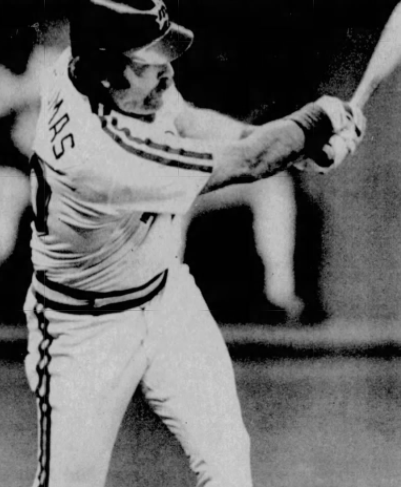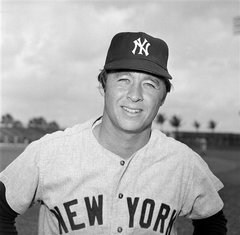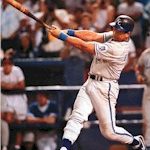On July 27, 1979 — The Brewers edge the Yankees, 6 – 5, and Cecil Cooper becomes the 4th American League player this month to hit three home runs in a game.
Cecil Cooper didn’t sleep a wink that night. The sun was rising when the adrenaline rush finally subsided, hours after his heroic performance in one of the most thrilling, most dramatic, most outrageously entertaining games in Milwaukee Brewers history.
“It was,” Cooper said, “one of the most exciting nights of my career.”
Thirty-five years ago Sunday — July 27, 1979 — the Brewers’ first baseman smashed three homers, including the game-winner off future Hall of Famer Goose Gossage with two out in the bottom of the ninth, to lift the Brewers to a 6-5 victory over the New York Yankees.
If you were among the 47,928 who shook and rocked old County Stadium’s metal bones that night, you surely remember what it was like.
Eighty-six degrees at game time, the humidity plastering hair to foreheads and shirts to backs…the air crackling with big-moment electricity…the despised Bronx Bombers, the defending World Series champions, with their pinstriped arrogance and their cast of larger-than-life characters…the upstart Brewers, coming off the first winning season in franchise history in ’78 and itching for more.
“They were ornery guys who thought they were supposed to win,” Cooper said of the Yankees. “And we were kind of starting to feel the same way.”
It was a Friday night, the opener of a three-game series that would be filled with edge-of-your-seat tension, bench-clearing brawls and theatrical fireworks.
If you weren’t there, or are too young to remember — of the current Brewers only Lyle Overbay, Aramis Ramirez and Kyle Lohse had even been born — the game is worth revisiting because few in franchise history can match it for sheer drama.
The Yankees back then were…well, how to describe them? Think of the team you despise most and multiply it by 10.
“I think there’s always a dislike for the Yankees,” said Sal Bando, then the Brewers’ third baseman. “Being in your own division (the American League East), I think there’s a bigger dislike for them.”
Owner George Steinbrenner was the symbol of big-city, big-spending conceit. Irascible manager Billy Martin had a perpetual chip on his shoulder. Reggie Jackson was the self-proclaimed “straw that stirs the drink,” with a home-run swing to match his enormous ego.
“They had some characters, some crazy guys on that team,” Cooper said. “But they had an awesome team with guys like Bucky Dent, Willie Randolph, Thurman Munson, Reggie, (Mickey) Rivers, (Lou) Piniella.”
The Brewers were coming into their own. After eight consecutive losing seasons (nine counting the franchise’s one year in Seattle), they’d gone 93-69 in 1978 and were en route to winning 95 games in ’79.
Bando and Cooper had arrived in 1977 to join Robin Yount and Don Money. Paul Molitor, Jim Gantner and Charlie Moore were ascending young players. Gorman Thomas had found a home in center field.
“We were a good team,” Bando said. “Oh, yeah, there was no question about it.”
Left-hander Mike Caldwell started the series opener. He was a bit of a character himself, known for carrying an expensive valise, in which he stored one item: a bottle of ketchup.
A crafty veteran who mixed speeds well, Caldwell already was known as the “Yankee Killer,” having shut out New York three times the year before.
“The Yankees always ruled the roost,” Caldwell said. “But I pitched extremely well against them my whole career. They had a lot of left-handers and free swingers in their lineup.”
The Yankees scored a run in the first inning, but Cooper answered in the bottom half with a two-out solo shot off starter Ed Figueroa. The homer earned Cooper a brushback pitch from Figueroa in his next at-bat, in the third.
“Figueroa was a different kind of guy,” Cooper said.
To underscore the point, when approached in the locker room after the game, Figueroa denied not only brushing back Cooper, but his own identity. “I’m not Figueroa,” he said, dismissing reporters while blow-drying his hair.
Jackson led off in the top of the fourth and Caldwell’s first pitch was high and tight and delivered the appropriate message.
“Mike was a hard-nosed, mean, grumpy kind of guy,” Cooper said. “He always stood up for his teammates.”
Jackson said nothing and worked the count to 2-2. On the next pitch, Caldwell again came inside, this time with a rising fastball that buzzed Jackson’s chin, causing the Yankees slugger to topple over backward.
“I’ll tell you exactly what happened, and it is truthful,” Caldwell said. “I wanted to throw Reggie a fastball on the inside part of the plate because he had some holes in his swing there. I was trying to telegraph to him that I was going to throw a curve and the ball slipped ever so slightly on my fingertips and I threw a fastball that was inside and it rode up on him.
“It turned into what you would call a perfect knockdown pitch.”
Jackson got up and dusted himself off. Caldwell then threw a curve and Jackson hit a towering pop-up to Bando at third.
Craziness ensued.
Caldwell moved toward Bando and was pointing to the ball and yelling, “Third!” when, out of the corner of his eye, he saw a bat coming at him. Jackson, trotting to first base, had expressed his displeasure with Caldwell’s pitch location by flipping his bat toward the mound.
“As I’m waiting for the ball, I hear the fans yelling,” Bando said. “That usually doesn’t happen with a pop-up, so I figured something was going on.”
An angry Caldwell picked up Jackson’s bat by the fat end and slammed it into the ground. Dissatisfied that it didn’t shatter, he took a step or two toward home with the intention of breaking it on the plate. Umpire John Shulock was already coming out to meet him.
“He said, ‘No, Mike, not here,'” Caldwell said.
By then, Bando had caught the ball, Jackson had rounded first and now, shedding his glasses and helmet, was rushing the mound as the dugouts emptied.
“He got his hands around my neck and if you’ve seen pictures of it, it looks like I got killed,” Caldwell said. “His momentum carried him over me and I wound up on top of him. My right arm was pinned under his neck. I had my left arm around the front of his neck and I think I tore two or three gold chains.
“Reggie said, ‘You threw at me!’ I said, ‘No, I didn’t throw at you.’ He said, ‘You swear to God? You swear to God?’ I said, ‘Hell, yeah, I swear to God.'”
It took 10 minutes to restore order but the only casualties were Shulock, who’d gotten in the way of a punch, and Brewers manager George Bamberger, who strained a calf muscle. Jackson was ejected but Caldwell was allowed to stay in the game, none the worse for wear other than a few scratches.
Martin declared that the Yankees were playing the game under protest, and when he returned to the dugout, he was pelted with a few objects and a fair amount of verbal abuse. He started climbing into the stands but was pulled back by players and security guards.
The game finally resumed and after the Yankees went ahead, 3-2, Money drove in a run and Cooper hit a two-out, two-run homer off Ron Davis in the seventh to put the Brewers back on top, 5-3.
Randolph answered in the eighth with a two-run shot off Caldwell to tie the score. Martin brought in the flame-throwing Gossage for the ninth and he quickly retired Molitor on a groundout and Money on a fly to center. Up came Cooper.
“Gossage was one of the toughest guys I ever faced,” Cooper said. “He was a big guy and he had that Fu Manchu mustache. He looked like he could take a big piece of steak and tear it in half.”
Gossage made Cooper look bad on a couple swings and ran the count to 1-2.
The next pitch, however, wound up in Brewers’ lore. Cooper turned on a fastball and the ball traced an arc in the night sky and disappeared over the right-field wall. Cooper hopped and skipped his way around the bases, the roar of “C-o-o-p!” ringing in his ears.
Bud Selig, then the Brewers’ owner and now the outgoing commissioner, called the fans’ reaction to Cooper’s game-winner the greatest he had ever seen at County Stadium.
Ken Sanders, a Brewers reliever who had retired in 1976, was in the stands that night.
“I was sitting in the seats right behind the Brewers’ dugout, about 10 rows back,” he said. “It was such a great game. The Cooper home runs. Caldwell and Reggie fighting. Billy Martin trying to get into the stands.
“There were so many neat things in that game. It was a classic. And that was a steppingstone to the Brewers becoming American League champions.”
Cooper’s game-winning two-run single in Game 5 of the 1982 ALCS against the California Angels was the biggest hit of his career. It propelled the Brewers to their first and only World Series appearance.
But his three-homer game against the Yankees ranks near the top of his biggest moments in baseball.
“It’s one of the top two or three games I ever played,” Cooper said. “I hit three homers off three different pitchers. And they were not slouches as pitchers.”
The next night, before 51,952 screaming fans, the Brewers tied a team record with seven doubles in a 9-2 victory. But the locker room was somber after the game when the players learned that Bando’s wife, Sandy, had been mugged in the County Stadium parking lot.
“She was eight months pregnant and she was tired so she left in the eighth inning,” Bando said. “In those days the wives didn’t park in a secured area. When she went to her car a guy jumped out and attacked her.
“She crawled under a car and then Fran Ferguson, who was part owner of the club, happened to be coming by and the guy took off. She was pretty beat up.”
Jackson learned of the incident the next day and said, “I don’t know what it is about Milwaukee. I think it’s because they drink so much beer here. I’m really afraid to play here.”
On Sunday, July 29, the Brewers completed the sweep with a 5-3 victory. In the seventh inning, Piniella doubled and tried to reach third on a grounder to Yount at short. Instead of sliding, Piniella ran into Gantner, the third baseman, and tried to dislodge the ball.
Gantner took exception, charged after Piniella and was intercepted by Yankees third-base coach Mike Ferraro. As they wrestled in the coaching box, Piniella threw himself into the fracas and both benches emptied again. Gantner was ejected and was joined in the ninth by Caldwell, thrown out from the bench for harassing first-base umpire Mike Reilly.
It was the last time the teams would face each other in ’79.
Four days later, Munson was dead, the twin-engine jet he was piloting crashing short of a runway in Canton, Ohio. The series opener, the game in which Cooper hit three homers, was the last game he ever caught.
“I didn’t know it was Munson’s last game behind the plate,” Cooper said. “He was one of the guys I really, really respected on that team. Munson was quiet, a professional, always a good guy to me.
“That was some kind of player there, man.”
As for Caldwell and Jackson, they patched up their differences years later.
“They used to have those Legends of Baseball (exhibitions),” Caldwell said. “I took my son Daniel to one of those in St. Louis and I introduced him to Reggie and we talked a little bit. Reggie spent 15 minutes talking to my son and signed several things for him.
“We had mutual respect for each other. Reggie made a lot of money striking out. I didn’t strike out a lot of guys. He’s the only guy in baseball I struck out 20 times.
“Everything is fine and dandy now.”
Cooper retired in 1987 after a 17-year career and worked a variety of baseball jobs over the next two decades. He was the Brewers’ farm director and returned to the dugout as bench coach in 2002. He managed the Houston Astros from 2007-’09.
Out of baseball now, Cooper said he’d like to come back to Milwaukee.
“I’d like to be involved with the Brewers in some capacity,” he said. “But it seems once the door shuts on you, it’s hard to open again.”
Told that 35 years had passed since that muggy, memorable three-homer night in a stadium since torn down, in a different league, in a different era, he said, “Well, it doesn’t seem like it. But I won’t forget it.”
Neither will we, Coop. Neither will we.
@ET-DC@eyJkeW5hbWljIjp0cnVlLCJjb250ZW50IjoicG9zdF90YWdzIiwic2V0dGluZ3MiOnsiYmVmb3JlIjoiIiwiYWZ0ZXIiOiIiLCJsaW5rX3RvX3Rlcm1fcGFnZSI6Im9uIiwic2VwYXJhdG9yIjoiIHwgIiwiY2F0ZWdvcnlfdHlwZSI6InBvc3RfdGFnIn19@
Sponsor this Page







